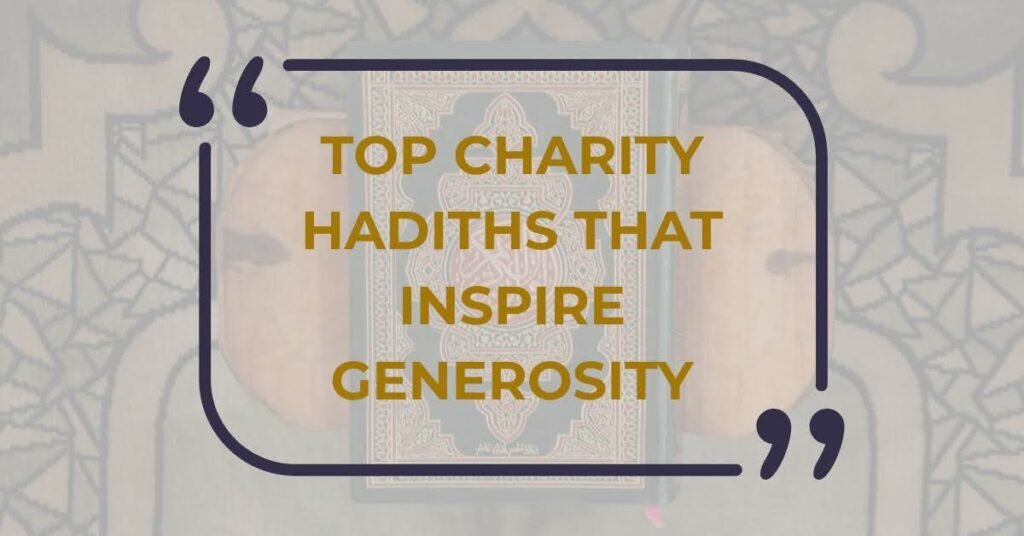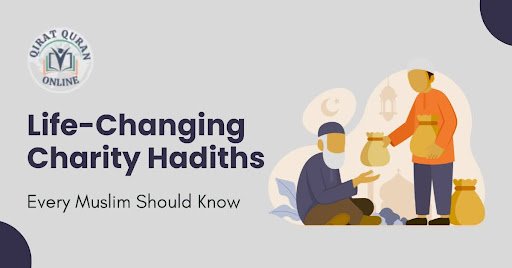Charity is the heartbeat of Islam. It is more than just giving money — it is about showing compassion, sympathy, and love for humanity. Prophet Muhammad (peace be on him) insisted on donation not only as a duty but also as a path of spiritual development and eternal reward. Through the guidance of the charity hadith, Muslims learn the transformational power to give, which can uplift both the donor and the receiver. Acts of charity, whether through wealth, time, or inheritance, have the power to leave a lasting impact beyond one’s lifetime. But what makes these things so powerful, and how can they really change your life? Let’s dive.
The Concept of Charity in Islam
Understanding donations in Islam highlights its role as a spiritual duty, a means of purifying wealth, and a way to benefit both individuals and society.
Definition of Charity (Sadaqah and Zakat)
In Islam, charity comes in two primary forms: Zakat and Sadakah. Zakat is mandatory, calculated as a percentage of your wealth, and distributed to those in need. On the other hand, Sadka is voluntary and can take any form – food, food, or even a smile. Both are important for creating a fair and kind society.
Benefits of Charity for Individuals and Society
Donating is not only about helping others; It also has a profound effect on the donor. It reduces attachment to physical property, encourages gratitude, and strengthens the community. The task of promoting sympathy reminds us that we are part of a large social taunt.
Spiritual, Emotional, and Social Rewards
Spiritually, charity purifies the soul and eats the pleasure of Allah. Emotionally, it cultivates sympathy and joy, while socially, it fosters confidence, cooperation, and support among community members. Hadiths clarify this: Charity is a win for all involved.
Top Charity Hadiths That Inspire Generosity

Explore powerful charity hadiths that motivate Muslims to give selflessly and transform their hearts through acts of kindness.
Hadith 1: Charity Erases Sins
The Prophet Muhammad (peace be upon him) said, “Charity does not decrease wealth.” This is profound—giving away wealth doesn’t make you poorer; instead, it brings blessings and spiritual growth. Every act of charity wipes away sins, helping you spiritually cleanse and earn Allah’s mercy.
Hadith 2: Helping Others Leads to Paradise
Another powerful charity hadith reminds us: “Whoever relieves a believer’s distress of the distressful aspects of this world, Allah will rescue him from the difficulties of the Hereafter.” Generosity isn’t just an act of kindness; it’s a pathway to paradise itself.
Hadith 3: Even Small Acts Count
The Prophet said, “Even a smile is charity.” This teaches that charity isn’t measured by quantity but by intention. Small, sincere acts—like helping a neighbor, guiding someone, or sharing knowledge—are just as valuable as big donations.
Explanation and Practical Application
Practical ways to implement these hadiths include donating to local charities, volunteering your time, or simply offering emotional support. Every act, no matter how small, contributes to a ripple effect of goodness.
Charity as a Form of Purification
In Islam, it purifies the soul and wealth, cleanses one of greed, strengthening faith and humility.
Purifying Wealth Through Giving
Charity is a spiritual tool for purification. By giving, you purify your wealth and soul from greed, selfishness, and materialism. The more you give, the less you cling to worldly property, and the more you focus on spiritual development.
Strengthening Faith and Humility
Charity produces humility. It reminds you that whatever you have is a blessing from Allah, and sharing those blessings strengthens your faith. As you give anything in return without expecting, your relationship with the divine gets deeper.
Charity Beyond Monetary Contributions
In Islam, donation becomes beyond money, incorporating acts of kindness, time, effort, and support that benefit others meaningfully.
Time, Effort, and Kindness as Charity
Not all donations are monetary. To help someone, spending time, offering guidance, or doing a kind act are all forms of sadaqah. These non-modern contributions often have a deep, more permanent effect.
Real-Life Examples of Non-Monetary Charity
Reading to a child, helping an elderly neighbor, or comforting someone in grief are all examples. Prophet Muhammad (peace be on him) emphasized the importance of these acts, proving that charity is equally about the intention of the action.
Charity and Social Impact
Charity strengthens communities by supporting the needy, reducing inequality, and fostering a culture of compassion and cooperation.
Building Stronger Communities
Charity strengthens communities by addressing social inequalities. It provides support for the vulnerable, reduces poverty, and creates a network of trust and care. Communities flourish when members care for one another.
Supporting the Needy and Vulnerable
Through charity, Muslims ensure that the less fortunate are not forgotten. The Prophet said, “He is not a believer whose stomach is filled while the neighbor to his side goes hungry.” This hadith underlines the social responsibility that comes with wealth and privilege.
Common Misconceptions About Charity in Islam
Many misunderstandings, it should be only for the rich, thinking or large, while giving importance to all honest acts of Islam.
Only Rich People Should Give
Many people believe that charity is only for the rich. But Islam encourages everyone to give according to their means. Even small tasks or contributions have immense value in the eyes of Allah.
Charity Needs to Be Large to Be Valuable
Integrate the donation into your routine – remove a portion of your earnings, help someone in need, or volunteer. Over time, these actions become a habit and enrich both your life and the lives of others.
Tips for Practicing Charity Regularly
Know practical ways to make a consistent part of daily life, changing into a meaningful and habitual practice.
Set Small, Achievable Goals
Start by committing to small, consistent acts of charity. Regularity is more important than size. It helps in cultivating a lifelong practice and making a habit for a lifetime.
Make Charity a Part of Daily Life
Integrate the donation into your routine – remove a portion of your earnings, help someone in need, or volunteer. Over time, these actions become a habit and enrich both your life and the lives of others.
The Connection Between Charity and Personal Happiness
Giving charity not only benefits others but also brings a sense of purpose for happiness, satisfaction, and the donor.
Scientific Insights Backing the Hadiths
Research suggests that the trigger gives a release of endorphins, often called “Helper High”. It beautifully aligns with Islamic teachings: charity not only benefits the receiver, but also enhances the joy of the donor.
Stories of Transformation Through Giving
Countless stories of Islamic history reflect how charity has changed life for both donors and recipients. These examples of real life strengthen the life-growing power to follow the guidance of the Prophet.
Frequently Asked Questions (FAQs)
1. What is the most important charity hadith?
One of the most important is this: “Donation does not reduce money.” This emphasizes that giving blessings, not harm.
2. Can small acts of charity make a difference?
Absolutely! Even a smile, a kind word, or helping with a hand is counted as charity and carries the great prize.
3. How often should a Muslim give charity?
According to someone’s means, donations should be given regularly. Both daily small acts and annual mandatory zakat are encouraged.
4. Is charity limited to money only?
No. Time, effort, guidance, and kindness are all valid forms of charity in Islam.
5. How does charity benefit the giver spiritually?
Donation purifies the soul, reduces attachment to materialism, strengthens faith, and earns Allah.
Conclusion
Donation is more than just a moral obligation in Islam – it is a transformative power that purifies the soul, strengthens communities, and earns divine rewards. Charity Hadith reminds us that every task, no matter how small it is, is deeply important. By practicing regular donations, Muslims can cultivate generosity, humility, and spiritual fulfillment. Start from today – Your small act of kindness can give rise to positive changes throughout life.

